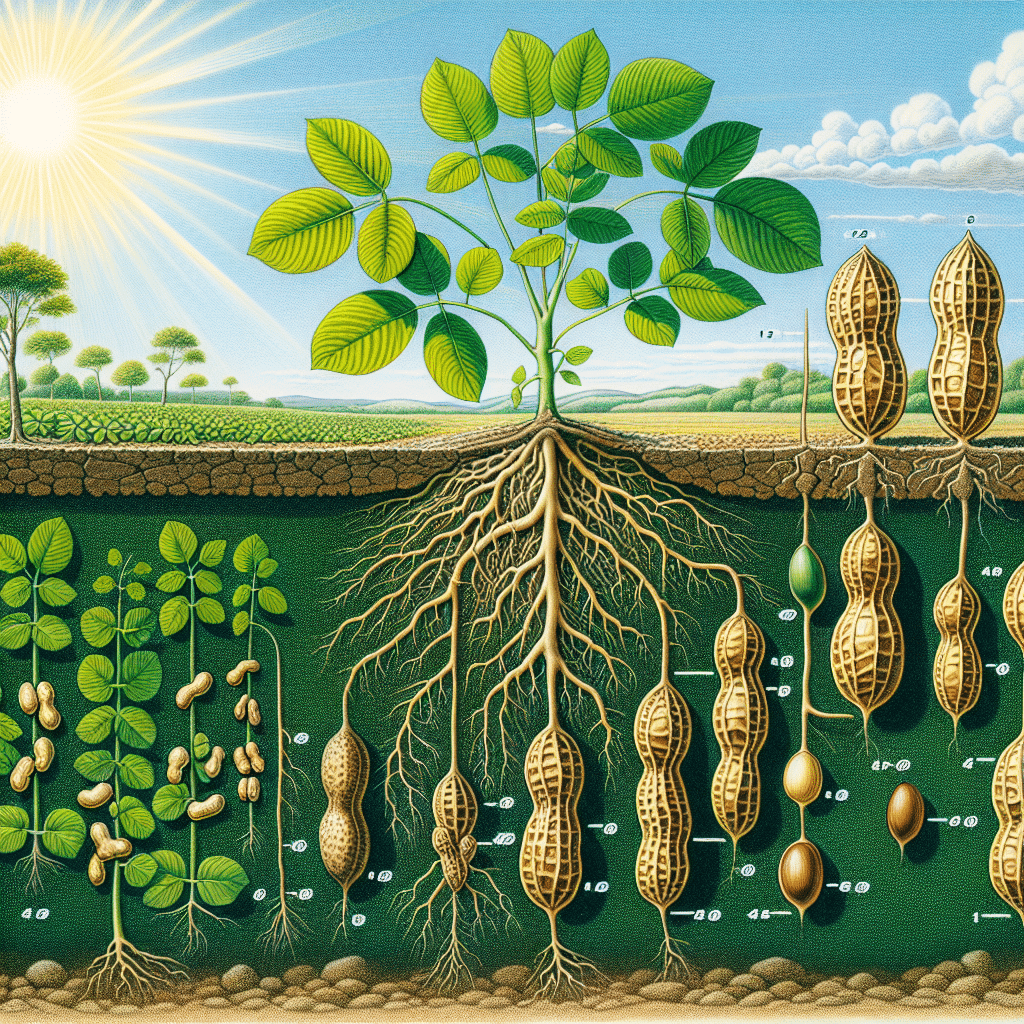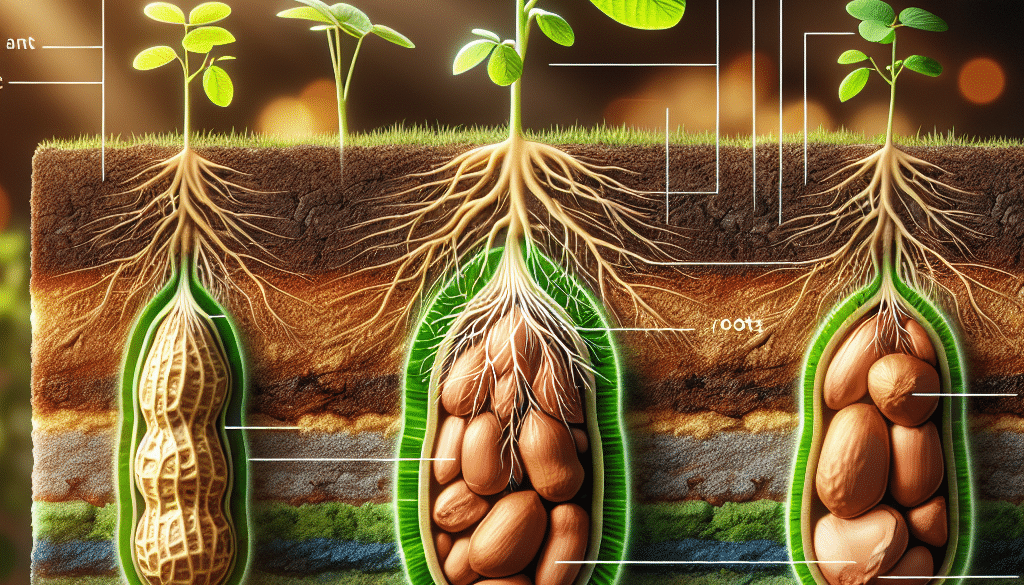Are Peanuts Underground: Unearthing the Truth
-
Table of Contents
- Unearthing the Truth: Are Peanuts Really Grown Underground?
- The Botanical Basics of Peanuts
- Agricultural Practices for Peanut Cultivation
- Global Peanut Production and Consumption
- Nutritional Benefits of Peanuts
- Conclusion: The Fascinating World of Peanuts
- Discover ETprotein’s High-Quality Peanut Protein Products
Unearthing the Truth: Are Peanuts Really Grown Underground?

Peanuts, a common snack enjoyed by millions worldwide, have a unique aspect that sets them apart from other nuts. Despite their name, peanuts are not actually nuts but legumes, and they have a fascinating growth process that occurs beneath the soil’s surface. This article delves into the botanical journey of peanuts, from planting to harvest, and explores the agricultural practices that make this underground wonder a staple in diets around the globe.
The Botanical Basics of Peanuts
Peanuts, scientifically known as Arachis hypogaea, are indeed grown underground. This characteristic distinguishes them from tree nuts like almonds, walnuts, and cashews. The peanut plant is an annual herbaceous plant that belongs to the legume family, which includes beans and lentils. Understanding the life cycle of the peanut plant is crucial to appreciating how and why peanuts develop beneath the soil.
- Germination: The peanut plant begins its life cycle when the seed, or peanut, is planted in well-drained soil after the last frost of the season.
- Flowering: The plant grows and eventually produces yellow flowers above ground. These flowers are self-pollinating, meaning they do not require external pollinators to produce fruit.
- Pegging: After pollination, a unique process called “pegging” occurs. The flower’s ovary elongates and grows downward, forming a “peg” that penetrates the soil.
- Development: The peanut pods develop at the ends of these pegs, maturing underground over a period of several months.
The peanut’s growth process is a fascinating example of geocarpy, a rare reproductive strategy where the seeds or fruits develop and mature beneath the soil’s surface.
Agricultural Practices for Peanut Cultivation
Farmers employ specific techniques to cultivate peanuts successfully. The process requires careful planning, from selecting the right soil and climate to the timing of planting and harvesting.
- Soil Preparation: Peanuts thrive in sandy loam or well-drained soils with a pH between 5.9 and 7.0. Farmers ensure the soil is loose and aerated to facilitate pegging and pod development.
- Climate: Peanuts require a warm climate with a growing season of at least 120 frost-free days. They are predominantly grown in regions with long, hot summers.
- Planting: Seeds are planted about 1 to 1.5 inches deep, with rows spaced to allow sufficient sunlight and air circulation for the plants.
- Irrigation: While peanuts are somewhat drought-tolerant, consistent moisture is necessary during the pegging and pod development stages.
- Harvesting: Harvesting peanuts is a delicate process. The plants are dug up, and the pods are allowed to dry before being separated from the rest of the plant.
These agricultural practices ensure a successful peanut crop, which is essential for meeting the global demand for this versatile legume.
Global Peanut Production and Consumption
Peanuts are cultivated in many parts of the world, with China, India, and the United States being the top producers. The global production of peanuts amounts to over 45 million metric tons annually, with a significant portion used for oil production, peanut butter, and direct consumption as snacks.
The versatility of peanuts is evident in their various culinary uses. They are a key ingredient in many cultural dishes, from African peanut stews to Southeast Asian sauces. Peanuts are also processed into numerous products, including peanut flour, protein powder, and peanut milk, showcasing their nutritional value and adaptability in different food forms.
Nutritional Benefits of Peanuts
Peanuts are not only delicious but also packed with essential nutrients. They are an excellent source of plant-based protein, healthy fats, vitamins, and minerals. Here are some of the nutritional highlights:
- Protein: Peanuts contain about 25-30% protein, making them a great option for vegetarians and vegans.
- Healthy Fats: Rich in monounsaturated and polyunsaturated fats, peanuts can help maintain healthy cholesterol levels.
- Fiber: The dietary fiber in peanuts aids in digestion and promotes a feeling of fullness.
- Vitamins and Minerals: Peanuts are a good source of B vitamins, vitamin E, magnesium, phosphorus, and potassium.
With their nutrient density, peanuts contribute to a balanced diet and can play a role in preventing chronic diseases when consumed as part of a healthy lifestyle.
Conclusion: The Fascinating World of Peanuts
In conclusion, peanuts are indeed an underground phenomenon. Their unique growth process, agricultural practices, and global significance highlight the importance of this legume in our diets. Peanuts not only provide essential nutrients but also contribute to culinary diversity and economic stability in many regions. Understanding the truth about how peanuts grow enriches our appreciation for this humble yet extraordinary food source.
Discover ETprotein’s High-Quality Peanut Protein Products
If you’re looking to incorporate the nutritional benefits of peanuts into your diet, ETprotein offers a range of high-quality peanut protein products. Their peanut protein is perfect for enhancing your meals with a boost of plant-based protein. Whether you’re formulating new food products or seeking to enrich your personal diet, ETprotein’s peanut protein is an excellent choice.
About ETprotein:
ETprotein, a reputable protein Chinese factory manufacturer and supplier, is renowned for producing, stocking, exporting, and delivering the highest quality organic bulk vegan protein and plant proteins. They include Organic rice protein, clear rice protein, pea protein, clear pea protein, pumpkin seed protein, sunflower seed protein, mung bean protein, peanut protein etc. Their offerings, characterized by a neutral taste, non-GMO, allergen-free attributes, cater to a diverse range of industries. They serve nutraceutical, pharmaceutical, cosmeceutical, veterinary, as well as food and beverage finished product distributors, traders, and manufacturers across Europe, USA, Canada, Australia, Thailand, Japan, Korea, Brazil, and Chile, among others.
ETprotein specialization includes exporting and delivering tailor-made protein powder and finished nutritional supplements. Their extensive product range covers sectors like Food and Beverage, Sports Nutrition, Weight Management, Dietary Supplements, Health and Wellness Products, and Infant Formula, ensuring comprehensive solutions to meet all your protein needs.
As a trusted company by leading global food and beverage brands and Fortune 500 companies, ETprotein reinforces China’s reputation in the global arena. For more information or to sample their products, please contact them and email sales(at)ETprotein.com today.














